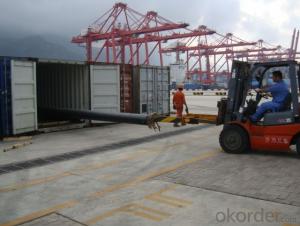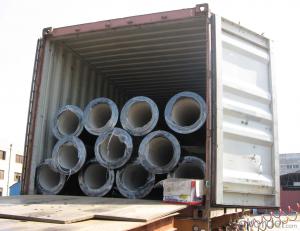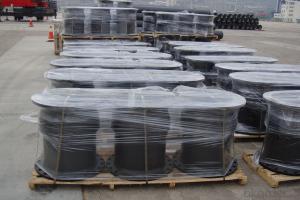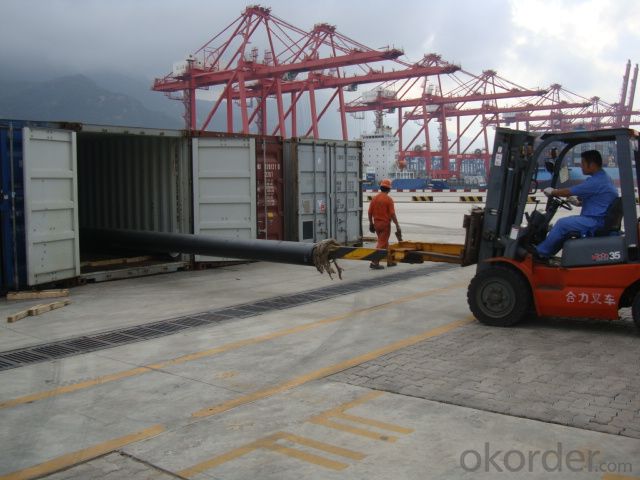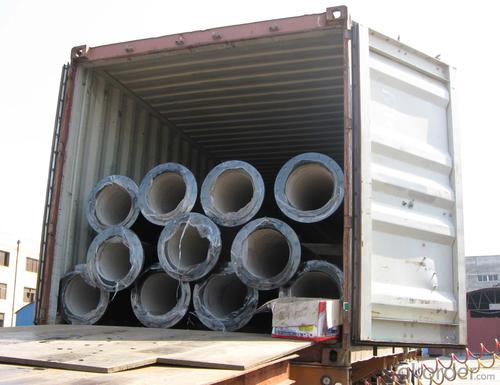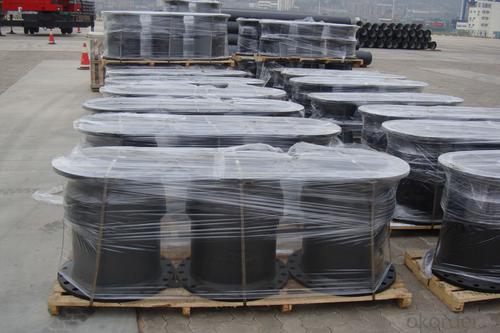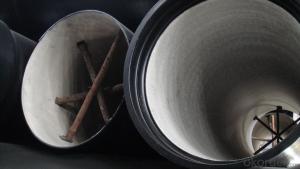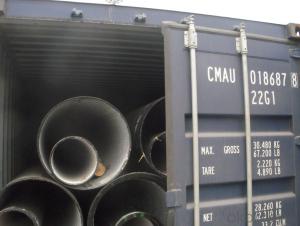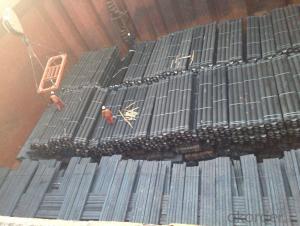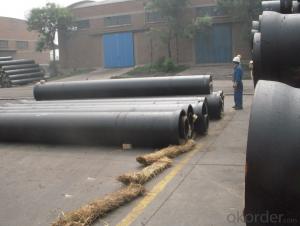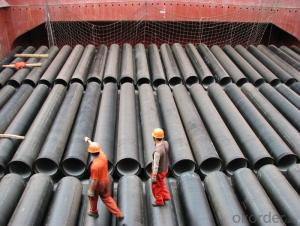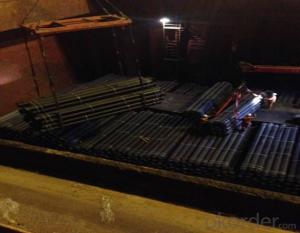DUCTILE IRON PIPES K8 DN80
- Loading Port:
- China Main Port
- Payment Terms:
- TT OR LC
- Min Order Qty:
- -
- Supply Capability:
- -
OKorder Service Pledge
OKorder Financial Service
You Might Also Like
Ductile Iron Cast Pipe is without any defects compare with tradition casting tech, which has many advantages particularly as follow:
(1) High density. In the "vertical upward casting" process, the melt iron of centre liquid column in center crystallizer is continuously feeding for volume shrinkage caused by condensation tube at outer circumference , which lead to be free of shrinkage porosity.
(2) High purity. When melt iron pouring, the mixed impurities such as gas, dross, sand grain which are lighter than melt iron could be eliminated at furnace mouth, its impossible to enter into the crystallizer through the channel, so the melt iron into the crystallizer is very pure.
(3) Strength with toughness. The cooling speed provided by continuous crystallizer is 30 times than sand casting and 5 times than centrifugal casting, and doesn't produce white iron, the eutectic cell volume of continuous cast iron is one eighth to one tenth compare with traditional cast iron. The density of graphite nodule in ductile iron can reach 300-700 pcs/mm2. Therefore, all reason above improve the strength and toughness of continuous cast iron.
(4) Free machining. The high speed cooling make the hardening phase (such as boride, steadite) not appear like reticular, massive or thick, but diffuse like fish bone and pane in shape, moreover, there are tiny graphite flakes inlaid hardening phase. It's free machining in BrinellHardness the range of 250-300HB. However, the Brinell Hardness of 250 is top limit to common metal materials.
(5) Uniform composition of tube wall. The convection mixing of liquid column caused by marching type drawing in crystallizer make the composition of tube wall well-distributed, and concentration gradient very little.
(6) High productivity. To the wall thickness of tube under 10mm, the speed of continuous casting is 1 meter/min, to the wall thickness of tube under 20mm, the speed of continuous casting is 0.5 meter/min, which is high efficiency that centrifugal or other casting tech couldn't reach.
- Q: Ways of connecting ductile iron pipes
- In our country, the national standards stipulated annealing, centrifugal casting, water delivery with ductile iron, straight pipe, pipe fittings, aprons and other technical requirements, China's production of ductile iron pipe products must meet the current national standards.
- Q: Are ductile iron pipes prone to external corrosion?
- Ductile iron pipes are generally not prone to external corrosion. This is due to the protective nature of the material itself. Ductile iron pipes are made of a strong and durable material that contains a significant amount of graphite. The graphite acts as a natural barrier against external corrosion, preventing the pipe from being affected by rust or other forms of oxidation. Additionally, ductile iron pipes are often coated with a protective layer, such as cement mortar or polyethylene, to further enhance their resistance to corrosion. These coatings provide an extra layer of protection, preventing any contact between the pipe and corrosive substances in the environment. However, it should be noted that while ductile iron pipes are generally resistant to external corrosion, they may still be susceptible to localized corrosion in certain conditions. Factors such as soil composition, moisture content, and the presence of certain chemicals can potentially lead to the corrosion of ductile iron pipes in specific areas. Therefore, proper maintenance and regular inspections are necessary to identify and address any potential corrosion issues promptly. Overall, ductile iron pipes are considered to be highly resistant to external corrosion, but like any other material, they require proper care and maintenance to ensure their long-term durability and reliability.
- Q: Can ductile iron pipes be used in areas with high soil acidity?
- Ductile iron pipes can be used in areas with high soil acidity, but certain precautions should be taken to ensure their longevity and performance. Ductile iron pipes are known for their strength, durability, and resistance to corrosion, which makes them suitable for various soil conditions, including those with high acidity. However, high soil acidity can still pose a potential risk to ductile iron pipes over time. Acidic soils can accelerate the corrosion process, potentially leading to the degradation of the pipe material. To mitigate this risk, several measures can be implemented: 1. Protective Coatings: Applying protective coatings to the outer surface of the ductile iron pipes can provide an extra layer of defense against soil acidity. These coatings, such as epoxy or polyethylene, act as a barrier, preventing direct contact between the pipe and the corrosive soil. 2. pH Adjustment: Adjusting the pH levels of the soil can help reduce its acidity. This can be done by adding lime or other neutralizing agents to the soil, which will help create a more favorable environment for the ductile iron pipes. 3. Cathodic Protection: Implementing cathodic protection systems can be an effective method to prevent corrosion in ductile iron pipes. This technique involves the use of sacrificial anodes or impressed current systems to create a protective electrical current that counteracts the corrosive effects of the soil. 4. Regular Inspections: Periodic inspections should be conducted to monitor the condition of the ductile iron pipes in areas with high soil acidity. This allows for early detection of any corrosion or degradation, enabling timely repairs or replacements to be carried out. By implementing these measures, ductile iron pipes can be effectively used in areas with high soil acidity, ensuring their long-term performance and minimizing the risks associated with corrosive soils. However, it is always recommended to consult with experts or engineers familiar with local soil conditions and the specific requirements of the project to determine the most suitable materials and protective measures.
- Q: Does centrifugal cast iron pipe work well with lining cement? Will it scale and breed bacteria?
- From the centrifugal ductile cast iron pipe with cement production process to analysis, the most core pipe by centrifugal molding, concrete water cement ratio, the centrifugal force, the coarse aggregate to the outer wall of the pipe and the pipe inside; because of fine aggregate and water removal, strength and wear resistance variation. When the inner wall of the pipe by long-term washing and soaking water, and inner wall wear and erosion, as the roughness increases, head loss increases, you will need to increase the pump lift, and operation cost for power consumption increases, also greatly increased.
- Q: Are ductile iron pipes suitable for use in industrial applications?
- Yes, ductile iron pipes are suitable for use in industrial applications. Ductile iron pipes are known for their high strength and durability, making them ideal for handling the demands of industrial environments. They are resistant to corrosion and can withstand high pressures and temperatures. Additionally, ductile iron pipes have excellent impact resistance, making them suitable for use in areas with heavy traffic or potential for mechanical damage. Their flexibility allows them to absorb vibrations and shocks, further enhancing their suitability for industrial applications. Overall, ductile iron pipes are a reliable and cost-effective choice for various industrial sectors such as water and wastewater treatment, mining, power generation, and chemical plants.
- Q: What is the excavation width of ductile iron pipes with diameters greater than 1400?
- Then, according to the soil characteristics, different slopes are calculated, and the width of the excavation is calculated according to the depth and slopeIf the soil is soft, high water content and easy to collapse, the excavation width will be wide, otherwise the slope will be steep and the excavation width will be narrow
- Q: How does ductile iron pipe perform in areas with high groundwater salinity?
- Ductile iron pipe performs well in areas with high groundwater salinity due to its inherent corrosion resistance properties. The high levels of salinity in the groundwater can cause corrosion and deterioration of certain materials, but ductile iron is highly resistant to this type of corrosion. Its composition and manufacturing process make it less susceptible to damage from corrosive elements, such as salt and minerals present in high salinity water. The corrosion resistance of ductile iron pipe is primarily attributed to its protective iron oxide coating, which forms naturally on the interior and exterior surfaces of the pipe. This coating acts as a barrier, preventing direct contact between the pipe and the corrosive elements in the groundwater. Additionally, ductile iron pipes are often lined with cement mortar or a protective epoxy coating, which further enhances their resistance to corrosion and provides an additional layer of protection. Furthermore, ductile iron pipe has a long lifespan, often exceeding 100 years, which makes it ideal for areas with high groundwater salinity. Its durability and resistance to corrosion ensure that it can withstand the harsh conditions associated with high salinity environments, minimizing the need for frequent repairs or replacements. In summary, ductile iron pipe is an excellent choice for areas with high groundwater salinity due to its corrosion resistance properties. Its protective iron oxide coating, coupled with optional linings, provides a reliable and long-lasting solution, ensuring the integrity and performance of the pipe system even in challenging environments.
- Q: How are ductile iron pipes different from other types of pipes?
- Ductile iron pipes, also known as DI pipes, are distinct from other types of pipes due to their unique properties and manufacturing process. Unlike other pipes such as PVC, steel, or concrete, ductile iron pipes are specifically designed to withstand high-pressure systems and offer exceptional strength and durability. One key difference lies in the material used. Ductile iron pipes are made from a type of cast iron that contains additional elements such as carbon and silicon, which give them their remarkable strength and flexibility. This composition allows DI pipes to handle high-pressure systems, making them suitable for applications that require reliable water supply, such as water mains, sewer systems, and industrial pipelines. Another distinguishing feature of ductile iron pipes is their ability to withstand external loads and pressure. DI pipes have a high tensile strength, which means they can bear heavy loads without cracking or breaking. This property makes them ideal for underground installations where they can endure the weight of soil, traffic, and other external factors. Furthermore, ductile iron pipes have excellent corrosion resistance. They are coated with a protective layer, usually through a process called cement lining, that guards against rust and corrosion caused by the elements, chemical reactions, or the transported fluids. This corrosion resistance significantly extends the lifespan of the pipes, reducing maintenance and replacement costs over time. Additionally, ductile iron pipes offer great flexibility. They are known for their ductility, meaning they can deform without fracturing under stress, making them less prone to cracks and leaks. This inherent flexibility allows them to withstand ground movement and seismic activities, ensuring a safe and reliable water distribution system. In terms of installation, ductile iron pipes are relatively easy to handle due to their lighter weight compared to other materials like concrete or steel. They are also available in various lengths and diameters, making them adaptable to different project requirements. Overall, ductile iron pipes stand out from other types of pipes due to their exceptional strength, resilience, corrosion resistance, and ease of installation. These properties make them a preferred choice for numerous infrastructure projects, where reliability and longevity are crucial factors.
- Q: How is ductile iron pipe different from other types of pipes?
- Ductile iron pipe is different from other types of pipes in several ways. Firstly, ductile iron pipe is known for its exceptional strength and durability. It is made from a unique composition of iron, carbon, and other alloying elements, which gives it superior mechanical properties compared to other types of pipes. This makes ductile iron pipe highly resistant to external forces and pressure, making it ideal for underground installations, water mains, and sewer systems. Secondly, ductile iron pipe has excellent corrosion resistance. It is typically lined with a cement mortar or an internal coating, which provides a protective barrier against corrosion and extends the pipe's lifespan. This makes ductile iron pipe highly suitable for carrying water and other fluids, as it prevents contamination and maintains the quality of the transported material. Furthermore, ductile iron pipe offers a high degree of flexibility. Unlike more rigid pipe materials like cast iron, ductile iron pipe has the ability to withstand moderate deflection and ground movement without breaking or cracking. This flexibility makes it less prone to failure and reduces the need for costly repairs or replacements. Lastly, ductile iron pipe is relatively easy to install and maintain. It is typically available in long lengths, which minimizes the number of joints required. Additionally, the pipe's mechanical properties and corrosion resistance make it less susceptible to damage during installation or operation, resulting in lower maintenance costs over time. In conclusion, ductile iron pipe stands out from other types of pipes due to its exceptional strength, corrosion resistance, flexibility, and ease of installation. These qualities make it a reliable and cost-effective choice for various applications, especially in the water and wastewater industry.
- Q: What is the DN400 installation charge for ductile iron pipes?
- The wages paid under special circumstances: refers to the provisions of the state laws, regulations and policies, due to illness, injury, maternity leave, family planning leave, funeral leave, leave, leave, leave, regular shutdown, implementation of national or social obligations due to pay a certain percentage of wage hourly wage or salary when.
Send your message to us
DUCTILE IRON PIPES K8 DN80
- Loading Port:
- China Main Port
- Payment Terms:
- TT OR LC
- Min Order Qty:
- -
- Supply Capability:
- -
OKorder Service Pledge
OKorder Financial Service
Similar products
Hot products
Hot Searches
Related keywords
